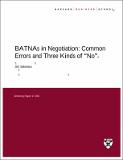| dc.contributor.author | Sebenius, James Kimble | |
| dc.date.accessioned | 2017-01-20T13:56:23Z | |
| dc.date.issued | 2017-01-20 | |
| dc.identifier.citation | Sebenius, James K. "BATNAs in Negotiation: Common Errors and Three Kinds of 'No'." Negotiation Journal 33, no. 2 (April 2017): 89–99. (Was Harvard Business School Working Paper, No. 17-055, December 2016.) | en_US |
| dc.identifier.issn | 0748-4526 | en_US |
| dc.identifier.uri | http://nrs.harvard.edu/urn-3:HUL.InstRepos:30011594 | |
| dc.description.abstract | The Best Alternative To a Negotiated Agreement ("BATNA") concept in negotiation has proved to be immensely useful. It is widely accepted that a more attractive BATNA (“walkaway option”) often increases one’s bargaining power. How well each party’s BATNA serves its interests determines whether a zone of possible agreement even exists in a negotiation and, if it does, where the zone is located. In tandem with its value in practice, BATNA has become a wildly successful acronym. Yet the initial characterization of this concept in Getting to Yes (Fisher, Ury, and Patton, 1991) along with many later interpretations can be problematic, limiting, and even misleading in at least three ways analyzed and illustrated in this article. First, early characterizations could be easily read to imply that one’s BATNA could not itself be a negotiated agreement. Second, and more serious, common descriptions of one’s BATNA as the “best outside option, independent of the other side” needlessly limit its applicability, especially in the many bargaining relationships where BATNAs are inherently interdependent. Third, BATNAs are often mistakenly described mainly as "last resorts" relevant only in case of impasse or "if the other side is more powerful." While savvy negotiators and analysts generally avoid these pitfalls, the less sophisticated can go astray. Robust correctives to these misimpressions are offered and related to three different kinds of “no” in negotiation: a "tactical no," a "no to re‐set" that permits moves to favorably alter the underlying setup, and a "final no." | en_US |
| dc.language.iso | en_US | en_US |
| dc.relation.isversionof | http://onlinelibrary.wiley.com/doi/10.1111/nejo.12176/abstract | en_US |
| dash.license | OAP | |
| dc.title | BATNAs in Negotiation: Common Errors and Three Kinds of "No" | en_US |
| dc.type | Journal Article | en_US |
| dc.description.version | Author's Original | en_US |
| dc.relation.journal | Harvard Business School working paper series # 17-055 | en_US |
| dc.relation.journal | Negotiation Journal | en_US |
| dash.depositing.author | Sebenius, James Kimble | |
| dc.date.available | 2017-01-20T13:56:23Z | |
| dc.identifier.doi | 10.1111/nejo.12176/abstract | * |
| dash.contributor.affiliated | Sebenius, James | |


